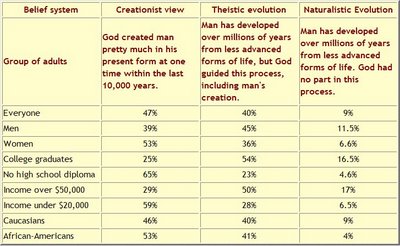Here is what professors believe:
| I don’t believe in God. | 10% |
| I don’t know whether there is a God, and I don’t believe there is any way to find out. | 13.4% |
| I don’t believe in a personal God, but I do believe in a Higher Power of some kind. | 19% |
| I find myself believing in God some of the time, but not at others. | 4.4% |
| While I have my doubts, I feel that I do believe in God. | 16.9% |
| I know God really exists and I have no doubts about it. | 35.7% |
To sum up, 23.4% are atheists or agnostics, 19% are Deists, 16.9% are theists with doubts, and 35.7% are theists with no doubts. Professors are significantly less religious than the general population, but more than half are traditional theists and almost another fifth are Deists.
Some other interesting tidbits:
Professors at elite doctoral universities are much less religious than professors teaching in other kinds of institutions. 36.6 percent of respondents with appointments in elite doctoral schools are either atheists or agnostics, as compared to 15.2 percent of respondents teaching in community colleges, 22.7 percent of those teaching at BA granting institutions, and 23.5 percent of those teaching in non-elite doctoral granting universities. And whereas about 40 percent of community college professors and professors at four year schools say they have no doubt God exists, this is true for only about 20.4 percent of professors at elite doctoral institutions. Contrary to popular opinion, atheists and agnostics do not comprise a majority of professors even at elite schools, but they are present in much larger numbers there than in other types of institutions.
There is also significant variation on this question by disciplinary field. Looking at the top 20 BA granting fields, we find that atheists and agnostics are more common in some disciplines than others. Psychology and biology have the highest proportion of atheists and agnostics, at about 61 percent. Not far behind is mechanical engineering, 50 percent of whose professors are atheists or agnostics. Behind that is economics, political science, and computer science, with about 40 percent of professors falling into this category each. At the other end of the spectrum, 63 percent of accounting professors, 56.8 percent of elementary education professors, 48.6 percent of professors of finance, 46.5 percent of marketing professors, 46.2 percent of art professors and professors of criminal justice, and 44.4 percent of professors of nursing say they have no doubt that God exists. We caution, however, that some of these differences may be a function of the differential distribution of these fields across types of institutions.
Only 6.1 percent of respondents to our survey said the Bible is the "actual word of God," with 51.6 percent describing it as "an ancient book of fables, legends, history, and moral precepts." About 42 percent of respondents are of the view that the Bible is "the inspired word of God." Here again differences are evident by type of institution, with community college professors three times as likely to subscribe to the "actual word of God" position, and 72.9 percent of professors at elite doctoral universities taking the "ancient book of fables" view.
We also asked respondents to weigh in on the controversy over intelligent design. Our question asked respondents how much they agreed or disagreed with the following statement: "The theory of intelligent design IS a serious scientific alternative to the Darwinian theory of evolution." Overall, 84.1 percent of professors surveyed disagreed with the statement, with 75.3 percent registering strong disagreement. Agreement was strongest at community colleges, where 30.6 percent of professors see intelligent design as a serious scientific alternative, and weakest at elite doctoral universities, where just 5.6 percent of professors do.
Finally, although our research suggests that professorial religiosity has been previously underestimated, it is clear that on the whole, and measured various ways, professors are less religious than the general U.S. population. Insofar as this is so, and in the context of growing pressures on young people to go to college and the ongoing political mobilization of conservative Christians, we should expect continued conflict in the years to come between the forces of religious conservatism and the institution of the American university, with some such conflict taking place within the university itself as conservative professors, some emboldened by their religious views, mount a campaign for institutional change. 80 percent of Americans think colleges and universities welcome students of faith – but 20 percent do not, and there is evidence that this is a mobilized 20 percent. Theoretical frameworks must be developed to help us make sense of this situation, and to identify the steps that can be taken, if any, to keep the conflict from derailing the vital educational and research missions served by America’s colleges and universities.
Not too many surprises. Professors at elite schools are much less religious while those at community colleges are much more religious, those in more scientific fields are less religious, hardly any believe the Bible is the "actual word of God," and most believe "Intelligent Design" is not scientific.
I was surprised by how religious professors of accounting are as compared to other fields. 63% say they have no doubt God exists -- what's up with that?
